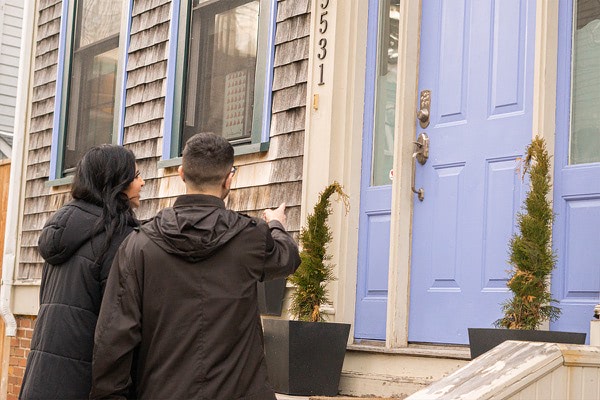New home buyer in 2024? In this post, we examine 5 important tips to follow when purchasing a house this year.

Buying a home? Here’s your official to-do list
Owning a home is a goal for many Canadians, but the process of getting to that point isn’t often easy. Buying a home can be a stressful and complex process, especially in the current market. One of the top ways to reduce your stress levels during this time is to have a to-do list of everything you need to complete. Good news, we did that part for you! Here are the top items to add to your task list.
Get pre-approved
This probably comes as no surprise to you if you’ve read our blog before! Getting your pre-approval is the most important first step you need to take when buying a home. As a quick refresher, a pre-approval is a snapshot of your current financial situation, such as your income, employment, and debt levels. A lender examines these factors to give you an estimate of the mortgage amount you may qualify for if your situation stays the same. As always, we want to remind you that a pre-approval doesn’t guarantee you a mortgage, but it gives you a good idea of what you might be able to afford. Plus, it means a lender already has your financial information, which will make the future approval process easier and quicker. You can read a full review of why you should get a pre-approval here.
Sort out your down payment and budget
Buying a home means you must provide some form of down payment. In Canada, your down payment needs to be at least five per cent of the home’s purchase price, and homes over $1 million require a 20 per cent down payment. Plus, down payments below 20 per cent also require a mortgage default insurance premium. Take some time to think about the source of your down payment and how big it will be. How much do you have in savings? Are you expecting an inheritance? Will you be receiving a gifted down payment from parents? Your down payment will affect your overall budget. If you plan to provide a $100,000 down payment and want it to make up 20 per cent, for example, this means your home’s purchase price can be up to $500,000. Your budget and down payment are closely linked when buying a home. Make sure you take the time to save for a suitable down payment amount, and understand what it will mean for your home’s total purchase price.
Hire an agent
Another thing we’re big on is using a real estate agent, whether you’re buying or selling. As we have mentioned before, buyers with agents are basically the only ones who have a chance of buying a home in this competitive market, as solo buyers are usually looked over. Sellers want an easy experience and are far more likely to consider a buyer with a professional on their side. With that in mind, be sure to select an agent who you think you will form a good relationship with. Ideally, your agent is used to working with buyers with your income, requirements, and general housing needs, and is familiar with the area you want to explore. Agents will find homes and arrange showings, and help you submit offers, so they will be an invaluable resource for you.
Make a list
Before you start actively house hunting, you should make a list of everything you require for your future home. This should include things like home size, property size, number of bedrooms and bathrooms, a finished or unfinished basement, garage size, neighbourhood, proximity to amenities, price, age of the home, date of renovations, and more. Not only will this help you narrow down what you want, but it will give your agent the best idea of which homes to show you. It will save you time to only tour homes you might have an interest in. You can also separate your list into needs and wants — which items are non-negotiable, and which can you live without?
Submit your offer
Once you’ve gone house hunting and have found a home you want to buy, it’s time to submit your offer. This is where things get a bit stressful and complicated, which is why you have your agent to help you out. They will help you find an offer that is close to the seller’s expectations, doesn’t destroy your budget, and fits with the appraised value of the home. The appraised value is the market value, which is what lenders use to determine the mortgage amount they will finance on a home. Traditional lenders won’t finance a mortgage for more than the home’s value, which is why it’s important to submit an offer close to the appraised value. Your agent will assist you with this process, and if your offer is accepted, it will be time to go back to a lender for the official mortgage approval.
Get approved
Now that you’re officially buying a home, it’s time to turn that pre-approval into a real approval! If you want to use the same lender who granted your pre-approval, they already have all your information, which should speed up the process. They will likely ask for updates on your finances if there are any, and from there, they will be able to get going on the approval. If you made a point of keeping your financial situation the same after you got your pre-approval, there likely won’t be any surprises or issues getting your approval. However, a big increase in debts or loss of income may make a lender approve you for a lower amount or reject your application altogether. Do your best to keep your finances steady after your pre-approval to avoid this issue.
Plus: save for closing costs
Remember, buying a home involves closing costs! These expenses won’t be as big as your down payment or monthly mortgage payments, but they will add up to a considerable amount of money. These include things like a home inspection, land transfer tax, property taxes, legal fees, mortgage default insurance if required, moving costs, and future utility bills. You should expect to spend at least a few thousand dollars on closing costs when buying a home.
This list isn’t an all-inclusive, down-to-the-detail schedule of everything you will need to do before buying a home. However, it gives you a good overview of what to expect and what you will need to accomplish during the process. Buying a house has a lot of steps, and keeping yourself organized is one of the best things you can do.
If you need a hand managing your mortgage needs, get in touch with us at Clinton Wilkins Mortgage Team! You can call us at (902) 482-2770 or contact us here.


